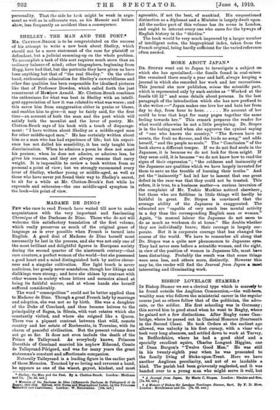MORE ABOUT JAPAN.* Dn. STOPES went out to Japan to
investigate a subject on which she has specialised,—the fossils found in coal-mines. She remained there nearly a year and half, always keeping a journal in which she recorded her work and her recreations. This journal she now publishes, minus the scientific part, which is represented only by such entries as " Worked at the fossils till 12 " and some details about persons. In the last paragraph of the introduction which she has now prefixed to it she writes :—" Japan makes one love her and hate her from day to day, from hour to hour No account of her could be true that kept for many pages together the same feeling towards her." This remark prepares the reader for what would otherwise be not a little perplexing. Dr. Stopes is in the hating mood when she approves the cynical saying of "one who knows the country," "The flowers have no scents, the fruit no flavour, and the birds no song," and adds herself, " and the people no souls." The " Conclusion " of the book shows a different temper. If we do not find souls in the Japanese, it is because we do not look for them aright. If they seem cold, it is because " we do not know how to read the signs of their expression "; "the coldness and insincerity of the Japanese are qualities which we have largely invented for them to save us the trouble of learning their truths." And yet the " insincerity" had led her to lament that one great defect in the race was that they could not be trusted. This refers, it is true, to a business matter—a curious inversion of the complaint of Mr. Yoshio Markino noticed elsewhere ; but those who are faithless in little things will hardly be faithful in great. Dr. Stopes is convinced that the average ability of the Japanese is exaggerated. The educated are " capable of very much less mental activity in a day than the corresponding English man or woman." Again, "in manual labour the Japanese do not seem to do as much as workmen do at home." She doubts whether they are individually brave; their courage is largely cor- porate. But it is corporate courage that has changed the course of the world. We have to remember all along that Dr. Stopes was a quite new phenomenon to Japanese eyes. They had never seen before a scientific woman, and the sight, in view of the position of women in Japanese life, must have been disturbing. Probably the result was that some things were seen less, and others more, distinctly. However this may be, the reader will find the Journal from Japan a most interesting and illuminating work.


















































 Previous page
Previous page